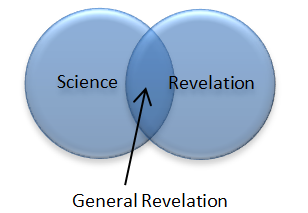Science and the Christian Faith
Science and revelation are both sources of truth, but have two different approaches by which they arrive at truth. Revelation is when God will make known truth to men. Direct revelation (sometimes called “specific revelation”) is when God speaks by way of prophets, manifestations of himself (such as the incarnation of Jesus, through appearances, dreams, visions, miracle, indwelling (such as the Holy Spirit), and scripture. Truth from science comes through empirical means by observing the world and attempting to understand how it works. Science and religious truth does have some overlap too. God is revealed through the natural world such that when one is observing the world, one is also observing the handiwork of God. This is “general revelation” or “natural theology”.
Generally speaking, science and revelation are consistent with one another, but difficulty arises when science and revelation appear to be inconsistent with one another. To resolve these conflicts, there are three basic approaches. First, one can reject revelation. This approach is problematic in that it precludes that revealed truth is in error. Second, one could reject science outright. This approach, however, is naive. The third approach is to attempt to come to a deeper understanding revelation in light of scientific truth. When considering the third approach one has to consider that revelation is unchanging, but what is called “truth” in science does change. For example, Newtonian physics explained many things in nature and were widely accepted as truth, but when science discovered relativity, Newtonian physics were supplanted relativistic physics.
When attempting to reconcile science with revelations there are something that one should be mindful of:
- While truth is unchanging and thereby infallible, what is not infallible is one’s understanding of it. Many claim to have understandings of revelation that stand in conflict with revelation. For these reasons, one should approach such things with humility and prayer asking for God to illuminate one’s mind to one may see clearly.
- Within the Christian worldview, there is what one calls “orthodoxy” and “heterodoxy”. Orthodoxy is a view that is the accepted truth, such as salvation by grace through faith in Jesus. This doctrine has no room for error. Teachings are heterodox when they are not heresy but at the same time aren’t the accepted truth either. One such doctrine is the mode of baptism – Baptists hold to baptism by immersion as symbolic of one’s new life in Christ while Presbyterians baptize infants. Both views would be considered “heterodox”. When one begin to understand the relationship between science and revelation one needs to be cautious about labeling some views heresy when such views maybe indeed be heterodox in the manner as one’s own view.
- When considering the overlap between revelation and science is that not everyone accepts revelation as a legitimate source of truth. For those that consider science as the sole proprietor of truth, they preclude the possibility of revelation in all forms. But any conclusion about God based on such things like lack of evidence is really not conclusions at all, rather assumptions as what is admissible as evidence. This is not a problem of science, rather a problem with the assumptions. Any purported conclusions then would be an abuse rather than a use of science.
Christians shouldn’t be afraid to engage in science, rather they should embrace it, as it helps gain a better appreciation for the intricacies of the universe that declare the glory of God (Psalm 19:1-2). Also, general revelation can be used as a way to show people they God near and eminent — he’s accessible and made known through the world, and for this reason people are without excuse when it comes to sin (Romans 1:18-21). But general revelation is not sufficient for salvation — one needs to know Jesus, and this comes by specific revelation that is preached by his followers (Romans 10:12-17). Using general revelation to point to God and then using specific revelation to point to Jesus is how one arrives as Jesus.
Related Devotions:
